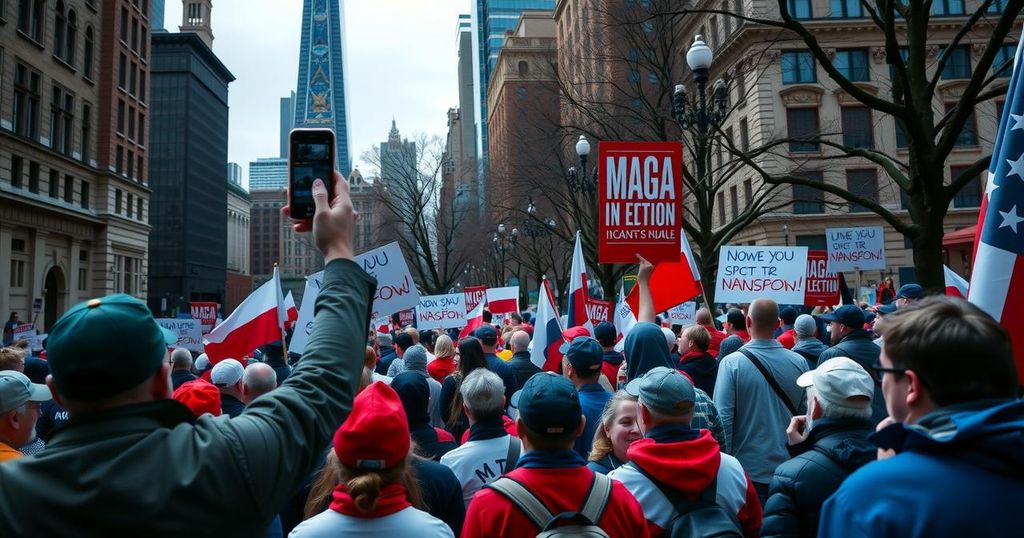MAGA Rally at Madison Square Garden: A Reflection of Political Hostility
A recent MAGA rally at Madison Square Garden featured inflammatory rhetoric from various speakers, including overt racism and calls for aggression against political opponents. While the event aimed to reinforce Trump’s influence in a predominantly Democratic state, it primarily showcased a culture of divisiveness and hostility among his supporters.
In a recent event reminiscent of a crusade at Madison Square Garden, supporters of Donald Trump gathered for what can only be described as a MAGA rally infused with aggressive rhetoric and provocative statements. The event commenced with a clip from the biopic “Patton,” featuring George C. Scott delivering a fiery monologue while juxtaposed against imagery of a massive American flag. This somewhat incongruous choice set a tense tone, evoking a sentiment of total warfare aimed not only at historical enemies but also against perceived domestic adversaries. The rally, which lasted over six hours, showcased a variety of speakers, including comedian Tony Hinchcliffe, whose remarks included overtly racist comments about Latinos, specifically referencing their family dynamics in a derogatory manner. Moreover, he made inflammatory jokes regarding Puerto Rico, exemplifying the raw bigotry often associated with Trump rallies. Other speakers echoed this hostile atmosphere, with Grant Cardone advocating for an aggressive stance against Trump’s political opponents and a mayoral candidate labeling Kamala Harris as “the Antichrist.” Trump’s own rhetoric was similarly combative as he referred to Democrats as the “enemy from within,” underlining a message of division that dominated the proceedings. Although the event may not have swayed many votes, particularly in a state like New York, which is predominantly Democratic, it served a symbolic purpose for Trump, providing a platform in a historically liberal stronghold. Trump’s son, Donald Trump Jr., proclaimed, “The king of New York is back to reclaim the city that he built,” indicating a desire to assert dominance amidst a politically hostile environment. The rally also aimed to cultivate a narrative of inevitability around a Republican resurgence, reflecting a broader strategy to connect with and energize the base. Alongside these affirmations of loyalty, figures such as Tucker Carlson articulated a controversial truth regarding the bond between Trump and his supporters, focusing on a narrative of liberation from societal expectations, stating, “He’s liberated us in the deepest and truest sense.” The overall atmosphere of the event, characterized by the use of heavy metal music and an aggressive presentation style, fostered what could be perceived as a hellish carnival, uniting Trump’s followers under a banner of defiance against their political rivals. The strategies employed at the rally reveal a commitment to not only galvanize support but also to redefine the prevailing political dialogue in America, suggesting a readiness among some factions to outright reject election outcomes that do not favor them.
The event at Madison Square Garden represents a broader trend within the Republican Party, particularly among MAGA supporters, which seeks to galvanize a sense of purpose and community through aggressive political rhetoric. This rally highlighted the fractious relationship between Trump’s base and mainstream political narratives, revealing how events such as these can serve both as a rallying cry for supporters and as a platform for controversial and extremist ideas. Such gatherings further amplify existing divisions within American society, especially as the political landscape becomes increasingly polarized.
In conclusion, the Madison Square Garden rally exemplifies the continued polarization of American politics, where the MAGA movement showcases unabashedly confrontational rhetoric aimed at both domestic political adversaries and established norms. This event not only reaffirmed Trump’s influence among his base but also illustrated the lengths to which supporters will go to bolster a narrative of conflict and dominance in the face of electoral opposition. As political tensions continue to escalate, the implications of such gatherings warrant close scrutiny and reflect a disturbing trend in contemporary American political discourse.
Original Source: www.nytimes.com




Post Comment